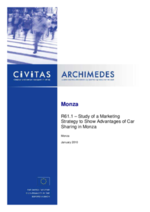Car-sharing scheme improvements (Monza)
Summary
In Monza, which has a population of 120,000, there are currently 75,000 private cars registered. This leads to a high demand for parking, especially in the central areas of the city. A recent analysis carried out in Italy, shows that private cars are used on average for only 20 minutes per day. If more people used car sharing, several problems in the city would be limited.
Implementing sustainable mobility
Monza introduced a car sharing scheme in April 2007. At the moment there are three cars available for around 150 private subscriptions.
The aims of this measure are to:
- Increase understanding of barriers to the use of car sharing;
- Increase car sharing subscriptions;
- Enact a marketing strategy study to show advantages of car sharing;
- Develop improvements to car sharing.
Progress
After conducting a study aimed at promoting the extension of car sharing in the five districts of Monza and at identifying potential users of car sharing service, in order to better plan the strategy, areas where a high number of potential users have been identified so that an efficacious campaign has been realized.
In order to implement an already existing car sharing scheme (managed by Car Sharing Italia and activated with just one car, later with three), previous locations of cars have been reconsidered exploiting experience gained before the beginning of ARCHIMEDES and it has been decided to rationalize their positioning. A marketing campaign has been focused on all citizens, but with a special consideration for young people. 50 free subscriptions to car sharing service lasting one year (25 of which are reserved to citizens between 18 and 35 years old) have been offered by Comune of Monza. GuidaMI (car sharing service provider) has added a bonus for free uses, with the aim of promoting car sharing service in Monza.
Benefits have proved not enough to pay back costs afforded by the managing society. As a matter of fact, Guidami is maintaining its vehicles in Monza in order not to loose the achieved customers and because economic losses suffered in Monza are offset by revenues from Milan, thanks to the joint management of the service in the two cities.
- More generally speaking, the given results show a limited economic efficiency of the service, since car sharing service need public contribution in order to cover losses and to operate without high deficits. Obviously, if we consider that car sharing is one of the answers that local policy makers can give to urban mobility demand, economic support from Municipalities is necessary to allow the service to be self-sustaining.
- It is possible that such a situation is due not only to the limited knowledge of the car sharing, but also to the fact that at national level there is no centralized management that could achieve considerable economies of scale: for instance, a unique head office could obtain more convenient conditions for car rentals or purchasing, vehicles’ fitting and maintenance.
A centralized national management could lead to an improvement of the activity as a whole through:
- greater weight of negotiation agreements at national level;
- single point of reference for Municipalities;
- greater standardization of procedures;
- better quality of service provided.
Outcomes
During the implementation of the measure, some barriers have been represented by difficulty in stimulating a change in the habit of using an owned car, in identifying the right communication strategy and in shifting towards a new cultural approach to mobility, also through the respect of parking places dedicated to car sharing vehicles. On the other hand, a strong political commitment, through the activation of facilities for car sharing users can be considered an important achievement to attract new users.
- Key result 1 - Results show a limited economic efficiency of the service, since car sharing service need public contribution in order to cover losses and to operate without high deficits. Obviously, if we consider that car sharing is one of the answers that local policy makers can give to urban mobility demand, economic support from Municipalities is necessary to allow the service to be self-sustaining. From users’ point of view, people are not willing to spend money on car sharing (most users consider that a fair yearly cost for car sharing service is no more than 100 euros), perhaps because of the economic crisis, and in fact only a few actual users will confirm the service without municipal incentive.
- Key result 2 – The goal of increasing the number of subscriptions and of car rentals has been completely achieved: from 40 active members in 2007 there are 146 in 2011 and from 414 rentals in 2007 there are 582 in 2011.
- Key result 3 – A good level of awareness and acceptance of the measure was achieved: car sharing users like having a car only when necessary and know most of the facilities the Municipality has activated for subscribers in order to promote the service (free parking in areas with a parking fee, opportunity to use the car during traffic stops, using bus lanes, etc.).









